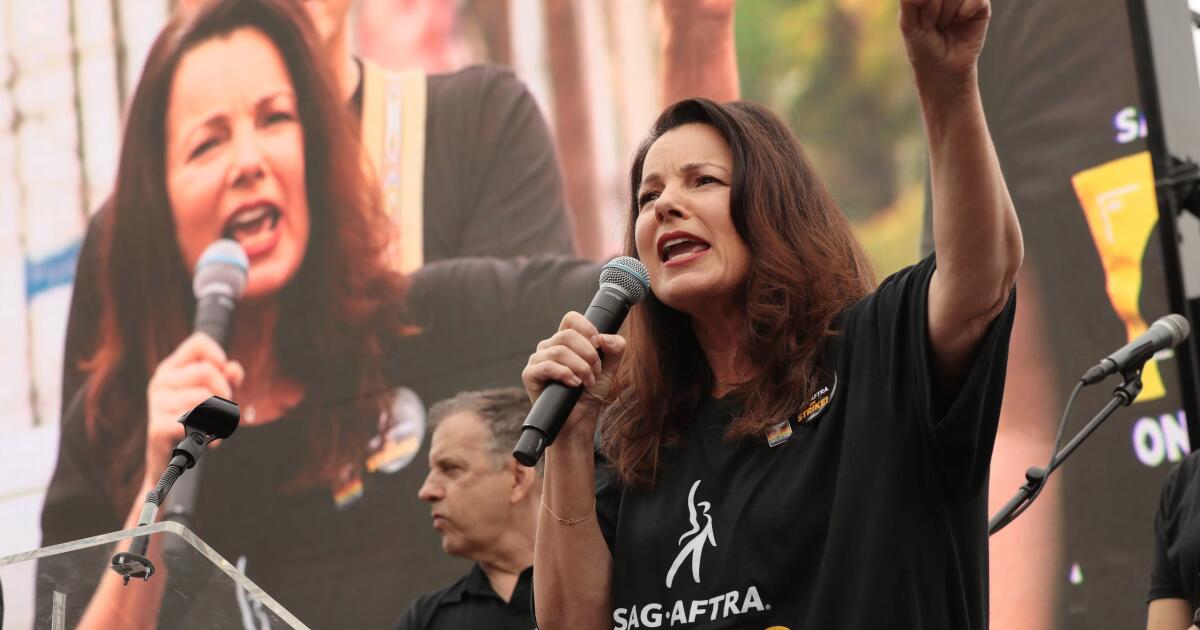Fran Drescher’s decision to not run for reelection as SAG-AFTRA president opens up the race to lead a major Hollywood labor union at a pivotal time as actors face issues such as the rise of AI and a challenging job market two years after a long strike.
Actors Sean Astin and Chuck Slavin are seeking to succeed Drescher in the upcoming election that aims to address concerns about job protections, healthcare and expanding residuals. Astin, known for acting in the “The Lord of the Rings” films, is on SAG-AFTRA’s national and local L.A. board, while Slavin is on the union’s New England board.
“It’s time in this specific situation where we really need reform,” Slavin said in an interview. “We’re not getting it, because what we’re getting right now is a rearrangement of the deck chairs on the Titanic.”
Hollywood’s entertainment industry has significant obstacles, as companies cut back on production amid studio consolidation and many TV and films are made elsewhere due to lower costs and financial incentives.
Meanwhile, innovation in AI technology has made it easier for artists to create their own visual effects and conceptualization of their ideas without hiring actors. All of that has made it more difficult for performers and other entertainment workers to find jobs that are sustainable to live in Southern California.
Hollywood unions are preparing to negotiate new contracts with major studios next year.
In 2023 — the last contract negotiations — the Writers Guild of America and SAG-AFTRA led dual Hollywood strikes that resulted in companies halting work on many productions. The deals that ended the strikes carved out more pay and AI protections for writers and actors.
Drescher was the face of the actors’ strike, delivering a fiery speech that addressed class issues in the entertainment industry. She asked whether Disney Chief Executive Bob Iger was an “ignoramus” after he said actors’ demands were not realistic.
SAG-AFTRA’s contract, reached after a 118-day strike, brought an estimated $1 billion in gains for members over three years, according to the union. The contract included streaming bonuses and AI protections, including requiring employers to have consent from actors before creating or using “digital replicas” and to pay performers if those replicas were used.
“Here’s a woman who’s challenging these male moguls and having to arm wrestle them, knowing that her own career could be at stake,” said Stephen Galloway, dean of Chapman University’s Dodge College of Film and Media Arts. “She was fearless.”
Drescher, known as the lead character in the sitcom “The Nanny,” had positioned herself as a nonpartisan leader. She was reelected amid the strike in 2023, receiving 81% of the votes cast. In her campaign statement, Drescher said that “member unity will be my greatest legacy.”
Drescher and SAG-AFTRA pushed for national and state legislation to bring more AI protections to performers, including bills that Gov. Gavin Newsom signed into law last year that gave actors more control over their digital likenesses.
Drescher’s decision to not run for reelection became official on Friday when her name did not appear on the voter guide distributed by the union. She did not respond to a request for comment.
Slavin said that while Drescher did a “fine” job, he felt the AI protections in its current contract could have gone a lot farther. The contract ended up getting approved by 78% of the votes cast by SAG-AFTRA’s members.
Slavin, who has acted in the movie “Annabelle Hooper and the Ghosts of Nantucket,” said his platform will prioritize AI guardrails, equitable contracts for all members regardless of their market size, advocate for better residuals and help protect vulnerable workers.
Astin is running as part of the “The Coalition” slate, which advocates for issues including AI protections, strengthening U.S. production and expanding residuals, according to its website.
Astin’s representative did not respond to a request for comment.
Staff writer Meg James contributed to this report.






